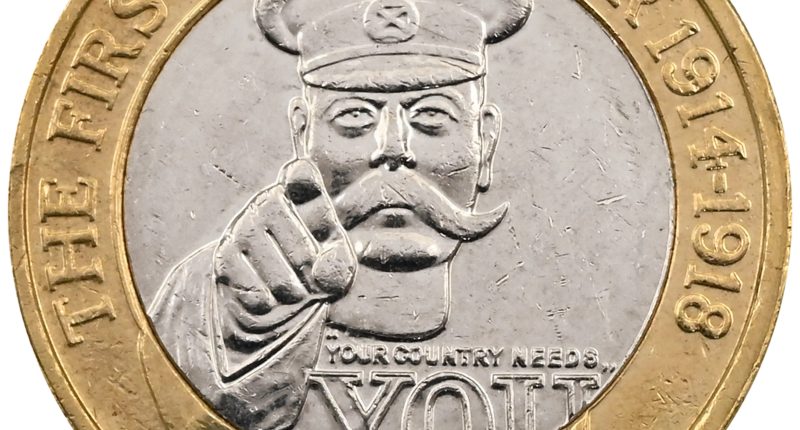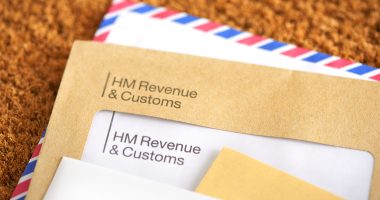A COIN believed to have the “rarest document error” is set to fetch at least £1,200 at auction.
Rare coins and bank notes regularly sell for hundreds and occasionally thousands of pounds because there’s a limited amount in circulation.
So it’s definitely worth checking your spare change to see if you’ve got any in your pocket.
Some rare coins have been known to sell for £900 in the past while one rare bank note bagged the owner a whopping £22,000 in auction.
Now, a £2 coin featuring an image of Lord Kitchener is set to fetch up to £1,200 at auction in Wiltshire on February 14.
The coin features the image of Lord Kitchener, famously used on recruiting posters during the First World War.
Most read in Money
But the £2 has a fault and it’s this error that experts say makes this coin so valuable.
RWB Auctions and The Britannia Coin Company believe the coin to be “the rarest documented ‘error’ coin in circulation”.
Coin specialist Christopher Collects said: “The Royal Mint carefully controls the coins that are released into circulation so it’s very unusual to find modern UK coins with mistakes.
“There have only been a handful of 2014 Kitchener error £2 coins found, making them perhaps the rarest coin that can be found in your change.
“Everyone knows about the Kew Gardens 50p but there were 210,000 of those minted – this error coin is on a completely different level.”
Most read in Money
Some 5,720,000 of the Lord Kitchener £2 coins were produced by The Royal Mint in 2014 to mark 100 years since the outbreak of the conflict.
While the standard Lord Kitchener £2 coins are fairly common, this coin is missing its denomination on the obverse side.
Usually these coins have the words “two pounds” on the heads side, along with a portrait of Queen Elizabeth II, but this error coin doesn’t.
The auction house said that the coin has been been authenticated by the experts at The Royal Mint Museum, who confirm that the wrong heads design was stamped onto the coin during production.
It’s not clear how many of this specific error coin there are in circulation, but there’s usually only a handful of pieces like this.
A signed letter from the museum’s Information and Research Manager is to be sold with the coin as evidence.
“Since they are so scarce, these Kitchener coins attract serious attention when they come up for sale, and I know lots of coin hunters will be watching this auction closely,” Christopher said.
The auction will take place online at www.rwbauctions.com.
Of course, always bear in mind while this error coin is set to sell for more than £1,000, you might not always get this amount for it, or other error coins like it.
A rare coin or bank note is only worth what someone is willing to pay for it.
How to check if a coin is valuable
A coin is generally considered rare if it has a low mintage figure – the amount that are put into circulation.
You can check how many of a specific coin were put into circulation on The Royal Mint’s website.
For example, the Kew Gardens 2009 50p has sold for almost £900 in the past because only 210,000 were minted.
In contrast, something like the Olympic Football 2011 piece, of which 1,125,500 were entered into circulation, has only sold for £18 in the past.
But it’s not just a low mintage figure that indicates whether a coin is likely to sell for multiple times its face value.
“Error” coins, like the 1980 50p piece, have been known to sell for hundreds of pounds too.
These come about after manufacturing errors, and in a lot of cases there’s only a few of them in circulation.
How to sell a rare coin
Once you’ve deciphered whether a coin is rare or not, you can sell it in a number of ways, including through Facebook, eBay or in auction.
If you’re selling through Facebook, be wary of the risks attached.
There have been instances where fraudsters have contacted sellers saying they want to buy a rare coin and ask for money upfront for a courier to collect it.
But the items were never picked up and sellers have been left out of pocket.
To avoid this happening it’s always worth meeting a potential buyer in person when using Facebook Marketplace.
Of course, make sure it’s in a public meeting spot that’s well-lit.
If you’re selling through eBay, you’ll have to start by registering for an account – you just have to enter your email address and come up with a password.
Once you’ve done this you can list a product – but make sure you’ve got good pictures and detail the condition of the coin to avoid disappointing buyers.
In most cases, the safest way to sell a rare coin will more than likely be at auction.
You can organise doing this via The Royal Mint’s Collectors Service, which has a team of experts who can authenticate and value a coin.
READ MORE SUN STORIES
You can get in touch via email and a member of the valuation team will get back to you.
Do bear in mind you will be charged for the service though. How much depends on the size of your collection.
Do you have a money problem that needs sorting? Get in touch by emailing [email protected].
Plus, you can join our Sun Money Chats and Tips Facebook group to share your tips and stories.











